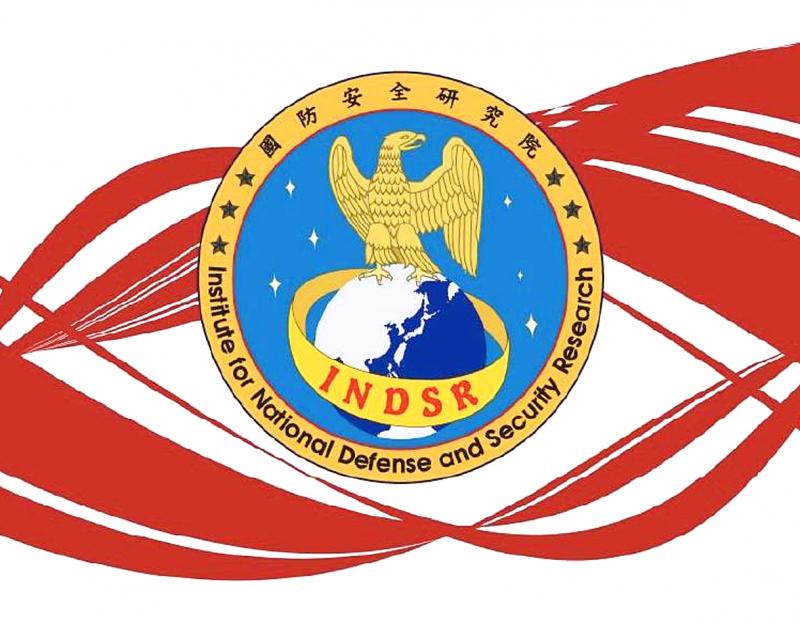Beijing will persist in its disinformation campaign against Taiwan, the Institute for National Defense and Security Research said in its latest report on Chinese political and military developments.
China’s Internet and social media-focused strategy is based on Russia’s cognitive warfare, which seeks to shape the target audience’s perception of reality via rumors, propaganda, agents of influence and other “active measures,” the Ministry of National Defense-
affiliated institute said in its 200-page report, titled 2020 Annual Assessment of the People’s Republic of China’s Political and Military Developments.

Photo: Aaron Tu, Taipei Times
Building on cognitive warfare, the Chinese Communist Party (CCP) aggressively manipulates virtual and real spaces to develop a “united front” strategy, the report says.
Chinese academics have added “brain dominance” to the Chinese People’s Liberation Army’s traditional “three warfares” strategy: public opinion warfare, psychological warfare and legal warfare, it says.
“The core of [brain dominance] is to achieve superiority in cognitive speed and quality, with the ultimate aim of influencing or changing the targeted audience’s thoughts and behavior,” it says.
Due to the COVID-19 pandemic, Beijing suffered a setback in its bid to set the narrative about China, but Chinese President Xi Jinping’s (習近平) speech before the Politburo in July — in which he quoted Mao Zedong’s (毛澤東) writings from On Protracted War (論持久戰) — suggests that the CCP would not relent, the report says.
Additionally, China has employed fabricated news to increase the intimidation effect of its military planes’ and warships’ movements around Taiwan over the past year, it says.
The aggressive disinformation campaign against Taiwan could be seen as an escalation following Beijing’s failure to influence the nation’s presidential election in 2016, it says.
“As these cognitive warfare operations were based on falsehoods, they were quickly repudiated and usually had the opposite of the intended effect,” the report says.
The backlash in Taiwan against this disinformation campaign has sparked doubts about its effectiveness and given rise to questions about whether China’s warfare is ultimately directed at itself, it says.
“The author believes that the intended target for China’s 2020 external perception warfare, which superficially is about changing perception abroad about China ... has eventually been transformed into a form of domestic perception warfare to ensure stability,” it says.
China used various media to push its perception warfare, including paid trolls and content farms to reach an audience willing to promote pro-Beijing propaganda, as well as employing hackers to launch cyberattacks, it says.
“China’s perception warfare is marked by efforts to control Chinese and foreign-language media outlets; infiltrate Chinese- and foreign-language social media platforms; produce Chinese stories to spread their influence; manufacture, insert or spread information to divide and to incite hatred; and manufacture incidents or gray zone conflicts to create or aggravate controversy,” the report says.
In particular, China is seeking to acquire partial or full ownership of foreign news media, monopolize advertising air time and paid content, and insert state-affiliated experts in independent news organizations, it said.
The Chinese-speaking press in Taiwan, Singapore, Hong Kong and the US are of special interest to Bejing, it says.
China News Service and CGTN are two state-owned media outlets that are playing an important role in flooding the overseas communities of Chinese-speakers with pro-Beijing propaganda, it says.

SECURITY: As China is ‘reshaping’ Hong Kong’s population, Taiwan must raise the eligibility threshold for applications from Hong Kongers, Chiu Chui-cheng said When Hong Kong and Macau citizens apply for residency in Taiwan, it would be under a new category that includes a “national security observation period,” Mainland Affairs Council (MAC) Minister Chiu Chui-cheng (邱垂正) said yesterday. President William Lai (賴清德) on March 13 announced 17 strategies to counter China’s aggression toward Taiwan, including incorporating national security considerations into the review process for residency applications from Hong Kong and Macau citizens. The situation in Hong Kong is constantly changing, Chiu said to media yesterday on the sidelines of the Taipei Technology Run hosted by the Taipei Neihu Technology Park Development Association. With

CARROT AND STICK: While unrelenting in its military threats, China attracted nearly 40,000 Taiwanese to over 400 business events last year Nearly 40,000 Taiwanese last year joined industry events in China, such as conferences and trade fairs, supported by the Chinese government, a study showed yesterday, as Beijing ramps up a charm offensive toward Taipei alongside military pressure. China has long taken a carrot-and-stick approach to Taiwan, threatening it with the prospect of military action while reaching out to those it believes are amenable to Beijing’s point of view. Taiwanese security officials are wary of what they see as Beijing’s influence campaigns to sway public opinion after Taipei and Beijing gradually resumed travel links halted by the COVID-19 pandemic, but the scale of

A US Marine Corps regiment equipped with Naval Strike Missiles (NSM) is set to participate in the upcoming Balikatan 25 exercise in the Luzon Strait, marking the system’s first-ever deployment in the Philippines. US and Philippine officials have separately confirmed that the Navy Marine Expeditionary Ship Interdiction System (NMESIS) — the mobile launch platform for the Naval Strike Missile — would take part in the joint exercise. The missiles are being deployed to “a strategic first island chain chokepoint” in the waters between Taiwan proper and the Philippines, US-based Naval News reported. “The Luzon Strait and Bashi Channel represent a critical access

Pope Francis is be laid to rest on Saturday after lying in state for three days in St Peter’s Basilica, where the faithful are expected to flock to pay their respects to history’s first Latin American pontiff. The cardinals met yesterday in the Vatican’s synod hall to chart the next steps before a conclave begins to choose Francis’ successor, as condolences poured in from around the world. According to current norms, the conclave must begin between May 5 and 10. The cardinals set the funeral for Saturday at 10am in St Peter’s Square, to be celebrated by the dean of the College